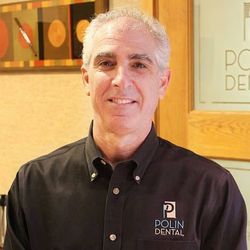Can I Get Dental Implants After Bone Loss? The Role of Bone Grafting
Posted by Carly Polin Dec 13, 2024

Are you considering dental implants in Boca Raton, FL, but worried about bone loss? You're not alone. Many people face this concern when seeking solutions for missing teeth. Bone loss can significantly affect your dental health and implant eligibility, but it doesn't have to be a dealbreaker. With advancements in dentistry, there are effective ways to restore lost bone and make dental implants possible again.
Let's explore how understanding bone loss works hand-in-hand with innovative techniques like bone grafting to help you regain your smile confidently!
Understanding Bone Loss and Its Effects on Dental Health
Bone loss is a common issue that affects many individuals, often resulting from tooth loss or prolonged periodontal disease. When teeth are missing, the jawbone begins to deteriorate because it no longer receives stimulation from biting and chewing.
This deterioration can lead to various complications. As the bone resorbs, not only does the facial structure change, but it also reduces support for dental implants. The lack of adequate bone height and width makes it challenging to place implants securely.
Moreover, bone loss can impact overall oral health. It may contribute to the misalignment of remaining teeth and increase the risk of additional tooth loss. Understanding these effects is crucial in addressing your dental needs effectively with professional guidance tailored specifically for you.
The Importance of Bone Grafting in Implant Procedures
Bone grafting plays a crucial role in dental implant procedures, especially for patients experiencing bone loss. When a tooth is lost, the jawbone can begin to deteriorate over time. This decline not only impacts oral health but can also complicate future implant placements.
By restoring the bone structure through grafting, dentists create a solid foundation for implants. The added bone material encourages new bone growth and supports the proper integration of the implant into your mouth.
Different types of grafts—such as autografts (using your own bone), allografts (donor tissue), or synthetic options—provide flexibility based on individual needs. Each option has its advantages and is tailored to ensure the best possible outcome.
With adequate support from healthy bone, dental implants have higher success rates and improved longevity. Bone grafting makes it possible for many patients to regain their smiles with confidence and functionality restored. Contact us to learn more.
Types of Bone Grafting Procedures
Bone grafting comes in several types, each tailored to specific needs.
- Autografts involve using bone from your own body. This could be taken from the jaw or another site, ensuring compatibility and reducing rejection risks.
- Allografts utilize donor bone sourced from a tissue bank. These are processed and sterilized for safety. They offer a viable option if you prefer not to undergo additional surgery.
- Xenografts use animal bone, typically bovine sources. This type is ideal for those looking for an alternative to human-derived materials.
- Synthetic grafts are made of biocompatible materials designed to stimulate natural bone growth without any risk of disease transmission.
Each method has its benefits and considerations, so discussing with your dentist will help determine which is best suited for your unique situation before proceeding with dental implants in Boca Raton, FL.
The Process of Getting Dental Implants After Bone Loss
Getting dental implants after experiencing bone loss involves several key steps. Initially, a thorough examination is conducted by your dentist or oral surgeon. This often includes X-rays and 3D imaging to assess the condition of your jawbone.
Once it's determined that bone grafting is necessary, the procedure will be scheduled. During this process, new bone material is added to the jaw to encourage growth and stability.
After allowing time for healing—usually several months—the actual dental implant procedure can proceed. The implant post is carefully placed into the newly grafted area of the jawbone.
Following this step, there's another healing period where osseointegration occurs. This means that the implant fuses with your bone, ensuring a strong foundation for your new tooth restoration later on.
Regular follow-ups are crucial throughout this journey to monitor progress and address any concerns along the way.
Recovery and Aftercare for Dental Implants with Bone Grafting
Recovery after receiving dental implants with bone grafting is a crucial phase. It requires patience and careful attention to detail.
- In the initial days, expect some swelling and discomfort. This is normal as your body begins healing. Ice packs can help reduce inflammation and ease pain.
- Follow your dentist's instructions regarding medication and diet closely. Soft foods are recommended during the early stages to avoid stress on the implant site.
- Oral hygiene remains vital, but be gentle around the surgical area. Brush carefully to keep everything clean without disrupting healing tissue.
- Regular follow-up visits are essential for monitoring progress. Your dentist will assess how well everything integrates over time.
Listening to your body's signals is key during recovery. If any unusual symptoms arise, don't hesitate to reach out for guidance from your dental professional in Boca Raton, FL.
Conclusion: How Bone Grafting Can Help Restore Your
When considering dental implants in Boca Raton, FL, bone grafting plays a crucial role for those who have experienced bone loss. This procedure not only helps rebuild the jawbone but also creates a stable foundation for implants. With advancements in techniques and materials, patients can achieve successful outcomes even after significant bone loss.
Bone grafting allows your dentist to enhance the volume and density of your jawbone. It opens up opportunities that may seem impossible otherwise. By integrating donor tissue or synthetic materials into the existing bone structure, you can regain functionality and aesthetics.
The journey towards restoring your smile involves collaboration between you and your dental professional. They will assess your specific needs and develop a tailored treatment plan that ensures safety and effectiveness throughout the process.
With proper recovery care, many patients find that their new implants feel just like natural teeth. Regular follow-ups with your dentist will ensure everything is progressing as planned.
Opting for dental implants following bone loss doesn't just improve oral health; it enhances overall quality of life too. Engaging fully in daily activities becomes easier when confidence returns alongside improved functionality in eating and speaking.
Investing time into understanding procedures like bone grafting empowers individuals to make informed decisions about their dental health journey ahead. Reclaiming lost function is possible with expert guidance every step of the way.
Visit Polin Dental at 2600 N Military Trl #320, Boca Raton 33431, or call (561) 997-2323 to learn more about our dental procedures.
Visit Our Office
Office Hours
- MON - WED8:00 am - 5:00 pm
- THU7:30 am - 5:00 pm
- FRI8:00 am - 1:00 pm
- SAT - SUNClosed







